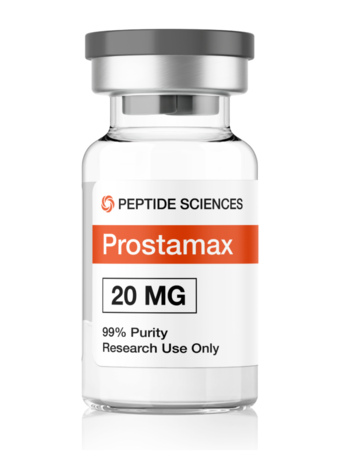Prostamax — Khavinson's synthetic peptide-bioregulator, which has a profound effect on DNA condensation in a number of cells. You can buy it in our online store. Although Prostamax is primarily of interest due to its anti-aging and anti-inflammatory effects on the prostate, it has also been shown that Prostamax optimizes the functions of a number of body cells (for example, lymphocytes) by changing the epigenetic control of DNA.
Prostamax and prostate
Chronic inflammation of the prostate (so-called chronic prostatitis) affects up to 16% of men at some point in their lives. This is a painful condition that causes burning during urination, urges and problems with urination. It can even cause difficult or painful ejaculation, as well as lower back pain. It is known that it is difficult to treat, it often requires long-term treatment with antibiotics for several months. There is also convincing evidence that prostatitis can lead to cardiovascular diseases and even cancer, so treatment of prostatitis is crucial for long-term health.
Studies on rats show that prostatitis can be treated with Prostamax, which reduces the signs and symptoms of the disease. In rats receiving Prostamax for only 15 days, a decrease in swelling of the prostate gland was observed, as well as less vascular stasis (hyperemia) and less infiltration by cells of the immune system. Interestingly, a decrease in the level of scarring of the prostate was also observed in rats, which indicates that the reduction in inflammation slowed down or even stopped pathological remodeling. Although the study was not long enough and in a sufficient number of rats to evaluate the effect of Prostamax on the risk of developing cancer, the results show that it is likely to reduce the risk by reducing the chronic inflammation that leads to pathological hypertrophy and hyperplasia.
According to Dr. Angelina Pakhomova, what makes the above study of Prostamax particularly interesting is that it is effective in treating a form of prostatitis called chronic abacterial prostatitis (CP). VP is the most common form of prostatitis, but it is difficult to treat, since it is not caused by a bacterial infection. Bacterial infections are easily treated with antibiotics. On the other hand, VP does not respond so well to antibiotic treatment, and sometimes does not respond at all.
In addition, the probability of recurrence is higher, and it has been proven that it is extremely unpleasant for those who suffer from it. The availability of an alternative treatment effective for VP could improve the quality of life of many men and prevent the disease in the future. The search for treatment for VP is more important than ever, since the incidence of this disease has increased almost 3 times since the end of the 20th century.
Prostamax and the immune system
Although Prostamax is considered tissue-specific, there is a lot of evidence that the bioregulator acts on cells outside the prostate. The most serious consequences are on ribosomes and densely packed chromatin of lymphocytes. In these cells, Prostamax, like Epitalon and Vilon, promotes the increase in the expression of ribosomes, which are responsible for the translation of mRNA into proteins. It also opens tightly packed chromatin, making genes more accessible for transcription into mRNA. Thus, Prostamax creates a basis for increasing gene expression at all levels, providing functional changes in the health of lymphocytes.
The effect of Prostamax on the immune system is also not purely theoretical. Studies show that the peptide helps to reduce the signs of chronic inflammation of the prostate, including edema, hyperemia, and infiltration of lymphocytes. This is due to both the effect of Prostamax on lymphocytes and their control over the immune response, and the role of the peptide in normalizing the growth and differentiation of prostate cells.
Prostamax Summary
Prostamax — a synthetic Havinson peptide that has a profound effect on the condensation of DNA in a number of cells.
Although Prostamax is primarily of interest because of its anti-aging and anti-inflammatory effect on the prostate, it has also been shown that
Prostamax optimizes the functions of a number of body cells (for example, lymphocytes) by changing the epigenetic control of DNA.




There are currently no reviews for this product.
Your review will be the first.
Tell other users of the site about the advantages and features of the product, share your impressions and expert opinion.